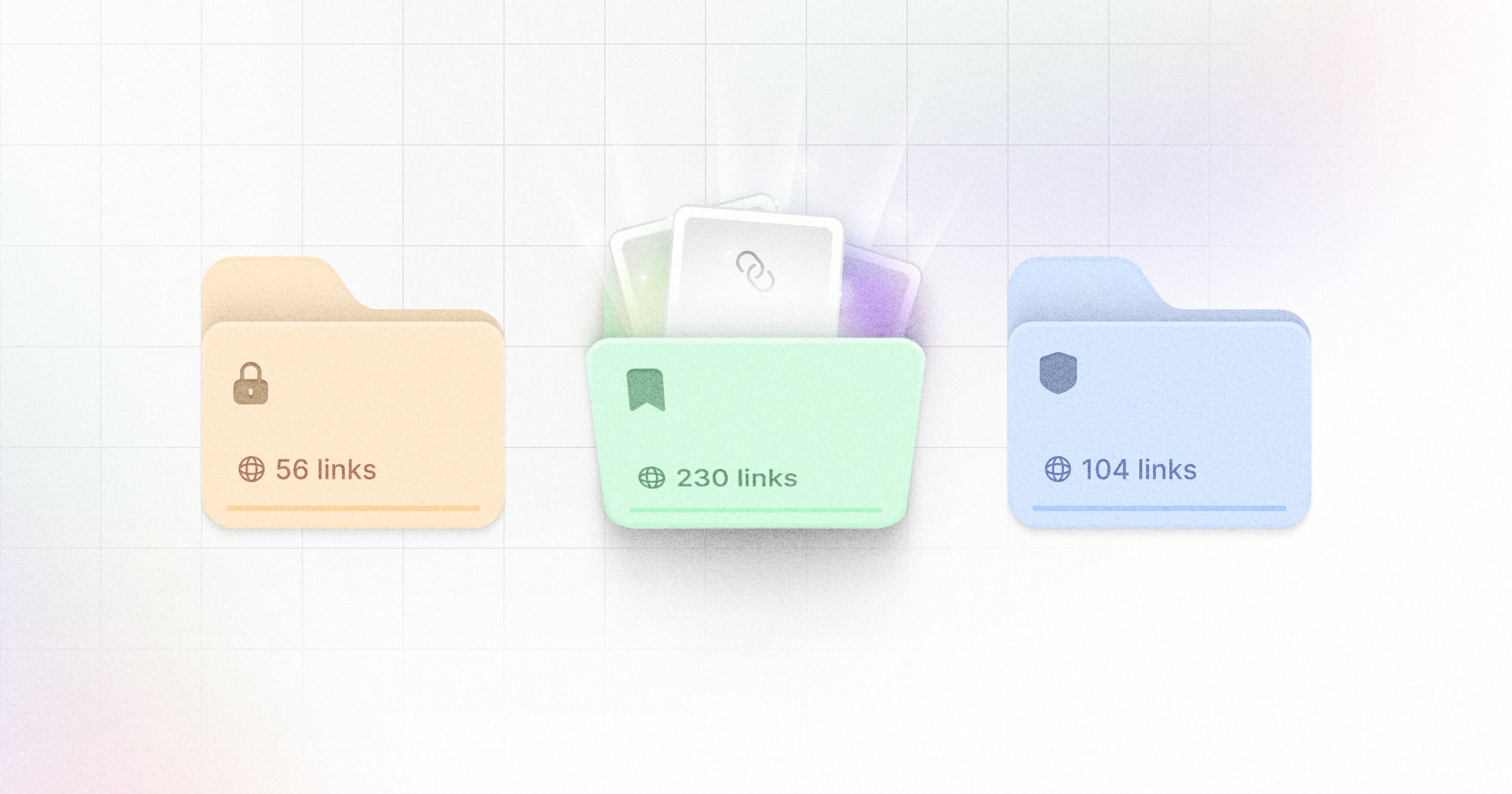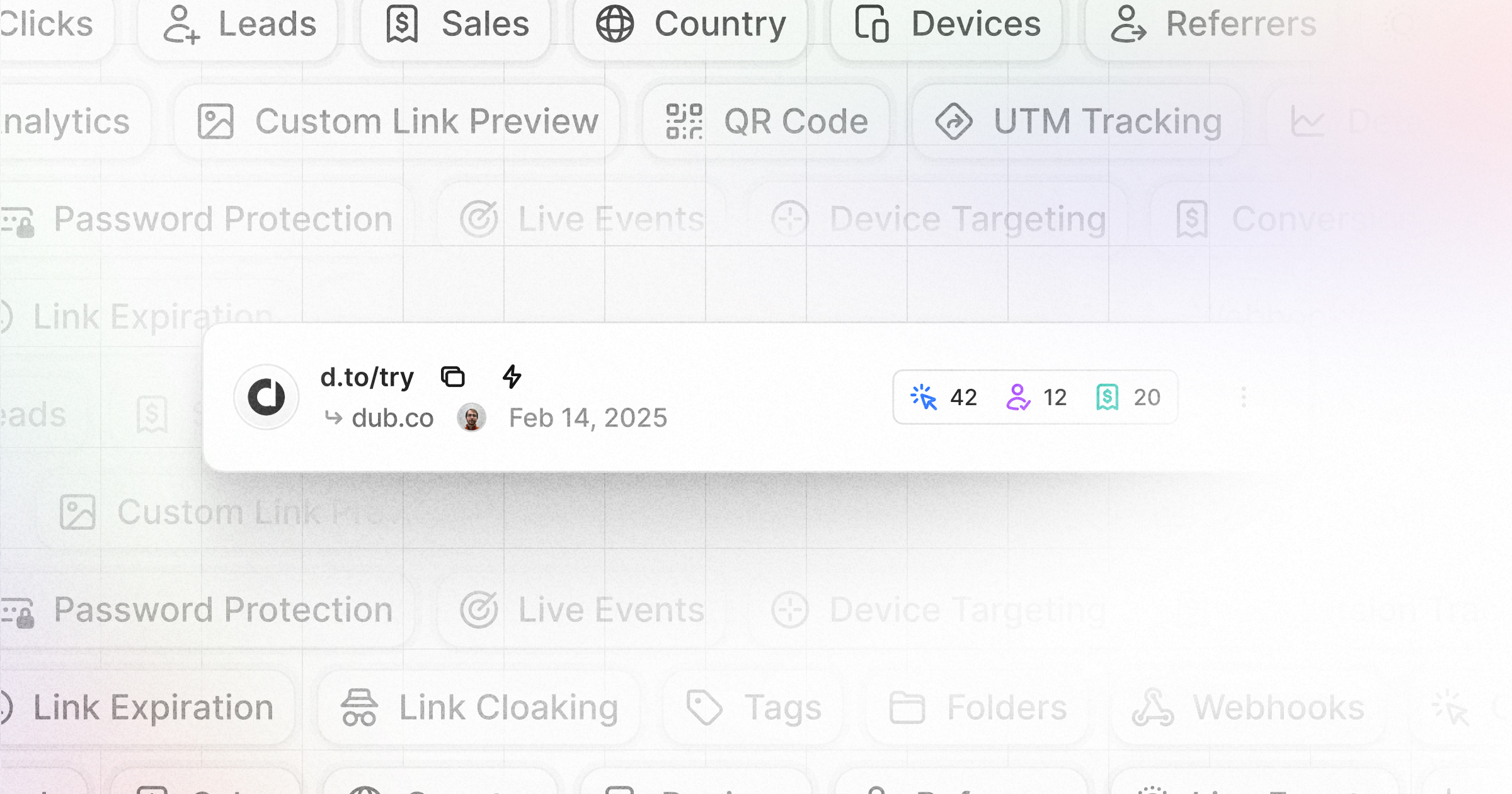Blog
Latest news and updates from Dub

Best Link Management Tools in 2025: In-Depth Comparison and Top Picks
This article compares top link management tools by evaluating their free plans, branding options, quality of analytics, developer features, and enterprise readiness.

Introducing Link Folders
You can now use folders to organize and manage access to your Dub links with fine-grained role-based access controls.

Introducing the Dub Affiliate Program
Join our affiliate program and earn 30% for each referral for up to 12 months. Users who sign up with your link get 20% off their first 3 months.

Advanced Link Management Strategies to Improve Conversions
Discover the Revenue Equation for Link Management and implement a proven blueprint to optimize every link for profit.

Ultimate Guide to UTM Tracking (with Tools and Templates)
Master campaign attribution with UTM parameters: Track, measure, and optimize your marketing ROI with proven templates and best practices.

Bitly vs Rebrandly: An updated comparison (2025)
A detailed comparison of Bitly vs Rebrandly – and how Dub is a better alternative to both.

Launch Week Recap: Celebrating 1 year of Dub
Here's a wrap-up of our first-ever launch week at Dub, where we launched Dub Conversions, Webhooks, and our new About page.

Introducing real-time webhooks for Dub
Leverage webhooks to connect Dub with your data stack and workflows – with native integrations for Segment, Zapier, Slack, and more.

Introducing Dub Conversions
Start tracking how your link clicks convert to signups and sales with Dub's powerful conversion analytics.

Bitly vs TinyURL: An updated comparison (2025)
A detailed comparison of Bitly vs TinyURL – and how Dub is a better alternative to both.

2024 Year in Review
As we put a wrap on 2024, here's a recap of some of the top features we shipped this year – and how we grew as a company.

Dub is now SOC 2 Type II Compliant
We're excited to announce that Dub has successfully completed a SOC 2 Type II audit to further demonstrate our commitment to security.

Introducing the new Dub Link Builder
Today, we're launching our new Link Builder, rebuilt from the ground up, to help you manage your links better.

Introducing 1-year Free .Link Domains On All Paid Plans
Today, we're excited to announce two new ways to create memorable short links on Dub – a 1-year complimentary .link domain on all paid plans and a new premium domain: dub.link.

Introducing Dub Integrations
Today, we're excited to unveil a new way to extend Dub's functionality with integrations. Get started with our flagship integrations, or build your own.

Why you should always use a custom domain for your short links
Still using generic short domains like bit.ly? Learn why custom domains are better for click-through rates, and how to choose one that best reflects your brand.

Introducing Real-time Events Stream
Gain deeper insights into your clicks with a detailed, real-time stream of events across your entire Dub workspace.

Introducing the new Dub links dashboard
Today, we're launching our new links dashboard – redesigned from the ground up – to help you better manage your links.

Google's goo.gl links will no longer work from August 2025 onwards
Today, Google announced that their URL shortener, goo.gl will no longer work from August 2025 onwards. Enter ggl.link – a free, branded successor to goo.gl for your Google links.

Announcing the Dub API General Availability (GA)
We're excited to announce that the Dub API is now generally available, with native SDKs in the languages you love.

Migrating from Contentlayer to Content Collections
We recently migrated our content framework from Contentlayer to Content Collections. Here's why and how we did it.

Introducing Workspace API Keys
We're excited to announce Workspace API Keys – a new and improved way for you to build integrations with the Dub API.

Introducing Dub Analytics 2.0
Dub Analytics 2.0 now comes with powerful new filters, an "Ask AI" feature, a sleek date range picker, and more.

Introducing Dub AI
Today, we're excited to bring you Dub AI – a suite of AI enhancements to help you manage your links more efficiently.

Building a Product Discovery Platform with Real-time Analytics using the Dub API
Learn how we built OSS Gallery – a crowdsourced list of the best open-source projects on the web – using Dub's API for real-time click analytics.

Building a Smart Datetime Picker – without using AI
We recently built a smart datetime picker that lets you enter any arbitrary time interval in natural language and auto-magically converts it to the right datetime format. Here's how we built it.

Using Zod to validate Next.js API Route Handlers
We recently added Zod to our Next.js API route handlers to validate the request body and query parameters. Learn why and how we did this.

Building a Scalable & Affordable Image Hosting Pipeline with Cloudflare R2
We recently migrated our image hosting from Cloudinary to Cloudflare R2. This post details the reasons behind the switch, the pros and cons of Cloudflare R2, and how we implemented it in our codebase.

How to get #1 on Product Hunt – a step-by-step playbook (2025)
On March 21, we launched Dub.co on Product Hunt and won #1 Product of the Month. Here's the step-by-step playbook of how we did it.

Introducing Tags 2.0: Filter Analytics by Tags & Multi-Tagging
Our revamped Tags feature now supports filtering analytics by tags and the ability to assign multiple tags to a link.

301 vs 302 Redirect: Which is better for SEO?
When it comes to SEO, 301 and 302 redirects are not created equal. Here's what you need to know about the differences between the two.

Pricing Updates (Jan '24)
We're making some changes to our pricing plans. Here's what you need to know.

Unveiling Dub.co's New Chapter
Excited to announce that I'm starting a company around Dub.co. Here's how it all started, and where we're going.

Introducing New & Improved Analytics for Dub
We're delighted to reveal our new and improved analytics dashboard, which is now available to all Dub users.

Migrating to Turborepo – What to Expect
We recently rewrote Dub's codebase to use a monorepo setup via Turborepo. Here's what we learned.

Introducing Dub.co – the new face of Dub
We're thrilled to announce our rebrand. Dub.sh is now Dub.co.

Dub.co Migration Assistants
We've added migration assistants for Bitly, Rebrandly, and Short.io to help you migrate your links to Dub.co in a few clicks.

Introducing the Dub Help Center
Today, we're excited to launch the Dub Help Center – a one-stop shop for all your Dub-related questions.

Introducing Dub
Meet Dub – an open-source link-management tool with built-in analytics and free custom domains.